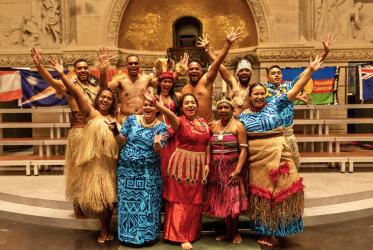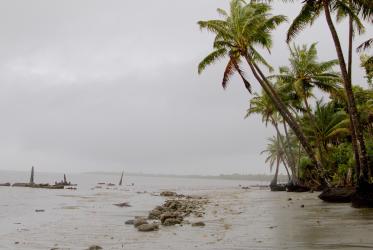Evangelical Church in New Caledonia and the Loyalty Isles
(Église Protestante de Kanaky Nouvelle-Calédonie)
This church is the fruit of the work of two mission bodies: the London Missionary Society (LMS) and the Paris Evangelical Missionary Society. From the very first contact of the LMS with the Pacific in 1779 in Tahiti, an in-depth effort was made to form Polynesians for the propagation of the gospel. Native agencies were set up in Samoa and the Cook Islands, from where Polynesian evangelists went to evangelize the islands of the South Pacific. They began working in what are now New Caledonia and the Loyalty Isles from 1841 onwards, well before the arrival of the first missionary from the Paris Missionary Society in 1902. During this period the Protestant Church in New Caledonia depended first on the LMS and was led subsequently by the Paris Mission. In 1958 a division occurred which resulted in the creation of two churches one of which, the Evangelical Church in New Caledonia and the Loyalty Isles, became autonomous in 1969.
The church attaches much importance to its cultural identity. It seeks to accompany the Kanaky people in their search for dignity and the community in its quest for emancipation, in view of shaping a new identity. To this end, the church is involved in a major effort of training national leadership. Another aspect is the search for forms of liturgy that are inculturated, and indigenous expressions of hymnology and prayer, based on the values and culture of the population. The church believes that in taking seriously the human being in the cultural, historical and social context, the Christian community can become the authentic people of God and a true witness of salvation. The EPKNC engages with other churches in the country in ecumenical dialogue and joint celebrations. Its area of mission is a young developing country that faces social problems such as alcoholism, suicide among young people, an increase of divorces, precarious life situations and drug addiction. Like the other countries of the Pacific it is threatened by global warming and ecological problems linked to development. New Caledonia is an overseas territory on the way to emancipation as stated in the Matignon Agreements of 1988 and the Agreement of Nouméa. In 2002 the synod of the EPKNC (then: EENCIL), reflecting on its missionary task, described its vision as "a church united in diversity in order to witness faithfully to God's mission here and everywhere". In all its actions the church tries to be the visible and intelligible witness of God's presence in the society and the world.
With the support of the Uniting Church in Australia, the Evangelical Church in New Caledonia and the Loyalty Isles maintains a chaplaincy for the hospitals in Sydney. Through the Cevaa, of which it is a founding member, the church is in partnership with churches in France, Switzerland and Argentina. It also cooperates with the churches in New Zealand, and with the Presbyterian Church of Vanuatu.


